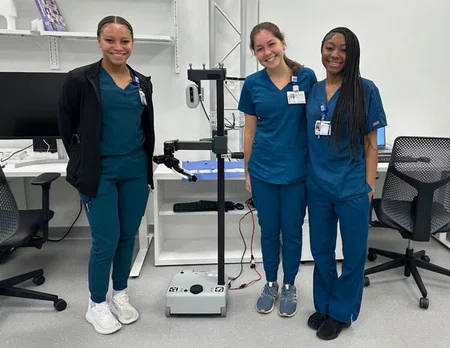© 2024. Houston Methodist, Houston, TX. All rights reserved.


In this
issue

WELCOME
NURSING SCIENCE

Robotic Tutor for Nursing

AI's Role in Nursing

Assessing the Knowledge and Attitudes of Registered Nurses About Artificial Intelligence in Nursing and Health Care
EDUCATION
PRACTICE

The Day in a Life of a Virtual Nurse and a Bedside Nurse

Enhancing Nursing Efficiency and Satisfaction with Smart Room Technology
PROFESSIONAL DEVELOPMENT

My Journey in Nursing: Into the Virtually Unknown

Engineered for Care: How Former Engineers Are Innovating Nursing
MAGNET
FROM OUR TEAMS

ABOUT DISCOVERN
NURSING SCIENCE
AI's Role in Nursing
By Deltra Muoki, PhD, APRN, AGNP-C, CMSRN, CNE, NE-BC, Nurse Scientist, Houston Methodist Sugar Land
By Deltra Muoki, PhD, APRN, AGNP-C, CMSRN, CNE, NE-BC, Nurse Scientist, Houston Methodist Sugar Land

A
rtificial Intelligence (AI) is the latest buzzword in social media, the news and workplaces. Although it seems to be the new catchphrase, it is not a new concept. Due to increased research and development over the past 10 years, more attention has been paid to AI (Pailaha, 2023). Therefore, nurses must participate in these discussions as AI becomes more prevalent in health care.
AI simulates human intelligence using machines to perform cognitive tasks such as analysis, decision-making and problem identification (Martinez-Ortigosa et al., 2023). It has been discussed at numerous symposiums, conferences and on global platforms that value innovation and advancement. The difference now is that societal norms are influenced by AI, causing communities to confront this new way of learning, discovery and conceptual analysis. There is still a lot of skepticism, fear and challenges surrounding AI. However, people are becoming more curious about where AI fits into daily life and work. This curiosity creates space for a robust, accurate understanding of AI and how it can be used to improve patient care.
In health care, AI is used to increase efficiency, reduce waste and human errors, streamline documentation and decrease costs. This can lead to enhanced quality of care and improved patient outcomes. There is concern that AI will replace human interaction with robots providing complete patient care. This perception leads to worries about job security in nursing and ethical issues. The intended purpose of AI is to assist nurses by assuming some administrative tasks and acting as a decision-support tool (Martinez-Ortigosa et al., 2023 & Pailaha, 2023). Human interaction remains a priority to ensure holistic care, sharing of clinical experiences among experts, and validating the best evidence-based practices to ensure quality patient outcomes.
AI is only as good as the information it receives. This is important to remember as AI influences patient outcomes, such as predictive analytics. Predictive analytics use expansive datasets to identify future outcomes (Ruksakulpiwat et al., 2024). This foresight assists with decision-making to enhance the quality of care. Therefore, it is still crucial that nurses provide accurate documentation. Although AI is being explored for its ability to use ambient listening to enhance documentation efficiency, nurses should still ensure accuracy as this information is used to build future AI algorithms. Nurses must conduct research incorporating diversity, equity and inclusion principles. It is also equally important that the research plan is robust, and the findings are disseminated. AI draws upon this knowledge to provide its simulated human intelligence to others in similar situations. Nurses want to be confident they are providing care that reflects the confounding variables (e.g., age, ethnicity, gender, religion, etc.) that affect patient outcomes. Therefore, nurses must keep abreast of the development and utilization of AI in health care.
References:
Martinez-Ortigosa, A., Martinez-Granados, A., Gil-Hernandez, E., Rodriguez-Arrastia, M., Ropero-Padilla, C., & Roman, P. (2023). Applications of artificial intelligence in nursing care: A systematic review. Journal of Nursing Management, 2023, 3219127. http://dx.doi.org/10.1155/2023/3219127
Pailaha, A.D. (2023). The impact and issues of artificial intelligence in nursing science and healthcare settings. SAGE Open Nursing, 9, 1-4. https://dx.doi.org/10.1177/23779608231196847
Ruksakulpiwat, S., Thorngthip, S., Niyomyart, A., Benjasirisan, C., Phianhasin, L., Aldossary, H., Ahmed, B. H., & Samai, T. (2024). A systematic review of the application of artificial intelligence in nursing care: Where are we, and what’s next?, Journal of Multidisciplinary Healthcare, 17, 1603-1616. https://doi.org/10.2147/JMDH.S459946









